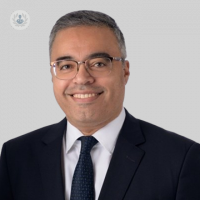Supported recovery: Improving long term outcomes for patients with mental health and substance use disorders
Written in association with:Along with medication and therapy, family support is a vital element of a supported recovery for patients suffering from a dual diagnosis, where mental health and substance abuse disorders are at play. In this informative article, highly esteemed psychiatrist Dr Khaled Helmy shares his expertise on the role of family support in helping patients with a dual diagnosis to recover and reintegrate, including invaluable advice for readers looking to help a loved one to return to their normal life. Dr Helmy also offers detailed insight on what is involved in a typical treatment journey for patients with mental health and substance abuse problems.

How can long term outcomes for patients with dual diagnosis be improved?
The long term outcomes for people with a dual diagnosis can be improved by what we call integrated services. For people with a dual diagnosis, seeing a psychiatrist for their mental health and a separate doctor who specialises in addiction for their substance use issues can cause problems as these two services are not talking to each other and this most likely means that the patient will not make a good recovery.
An integrated service that can help the client for both mental health issues and substance misuse is extremely important. In addition, receiving continuing help regarding the treatment of the dual diagnosis is also key, especially in someone with substance misuse as this is a chronic disease. Even when a person is no longer actively using drugs, they will require continuous help. In that sense, it's very important for the service not only to provide integrated services to deal with both mental health and substance misuse, but also to continue offering care with an aftercare programme going forward.
Treatment should not only be in the form of medication but should also be combined with other behaviour therapy, with the aim that this will eventually be the mainstay of treatment along with a recovery programme. It's very important that this support continues into an aftercare programme, either outpatient or inpatient, as people recover and continue their life. Also, self-help groups who deal with dual diagnosis can be very beneficial. Typically, people can join these groups without any fees, either virtually or face to face, and get support for their mental health, substance misuse or dual diagnosis.
Along with medication, behavioural therapy and attending a self-help group, adopting a healthy lifestyle is also very important. The guidance of a nutritionist can also be very beneficial as patients recover from substance use disorder if issues relating to self-esteem or anorexia are at play. Gaining weight, which often occurs as part of recovery, may itself be a trigger factor for relapse to drugs or deteriorating mental state and so input from a nutritionist is also very important.
What is the role of family and social support in treating dual diagnosis?
Family support and family therapy is very important. Unfortunately, mental health problems and substance use disorder both have a stigma attached, which may relate to public stigma, which comes from people outside of the family, stigma from within the family itself or even from the person in question who feels stigmatised themselves.
For that reason, it is very important for the family to understand that dual pathology, mental health disorders and substance misuse are illnesses and that people suffering from them can be helped and go on to recover. It’s also important to state that people affected by these issues are not bad people, and are in fact sensitive people who have been subjected to very unfortunate circumstances and have developed substance misuse or behavioural problems. Educating and raising awareness of this amongst families affected is vital.
After educating families about these illnesses, we have to also make it clear that the treatment involved is not one way or a simple, short process. In fact, it is a very long process for the patient and their family, involving their cooperation and that of various services to help them reintegrate back to normal life in the community. This may relate to the patient’s role as a parent, sibling, son or daughter within their family, or to their working life. Therefore, it’s vital that reasonable working adjustments are made to allow this person to adapt back to work, or even back to education in the case of younger patients. Whatever the individual situation, it’s important that patients are provided with the right tools to address their cognitive needs in order to allow them to successfully reintegrate, with support from family and a recovery programme.
Family awareness, understanding and empathic support is a key area of patients’ reintegration. Being empathic, however, does not mean being lenient. It’s important to maintain this fine line, being fair without stigmatising the patient in recovery while also not enabling them to continue with problematic behaviour. Educating families on how they can best support their loved ones in recovery is a vital element of long term success for the patient.
You can read more about how dual diagnosis is defined and the recommended approaches to treatment in Dr Helmy’s other informative article on the topic.
If you wish to schedule a consultation with Dr Helmy, you can do so by visiting his Top Doctors profile.


